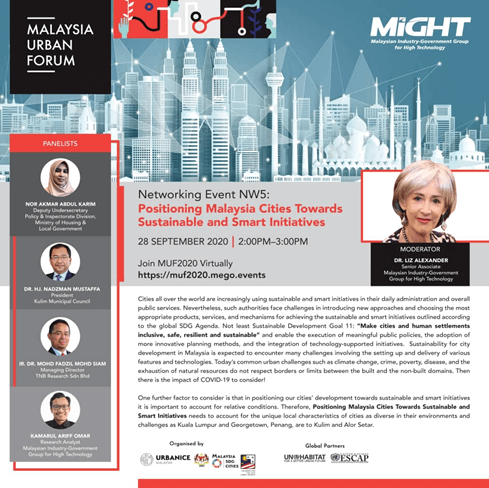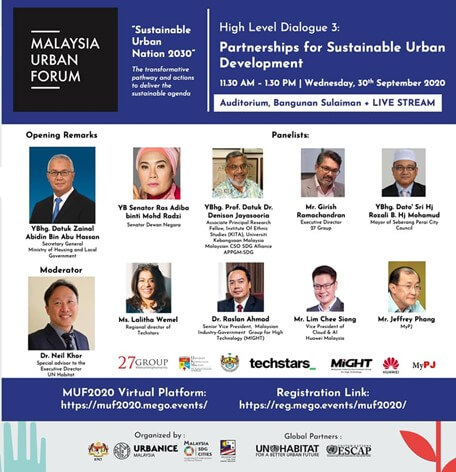Malaysia Urban Forum (MUF) 2020 is an inclusive platform for all stakeholders to participate, discuss and share thoughts, views, ideas and solutions to address many challenges urbanisation has brought upon us. This forum is in line with UN-Habitat’s National Urban Forum framework that promotes inclusive discussions towards improving Malaysia’s urbanisation strategies, policies, programmes and actions and includes participation from local, regional and national governments as well as stakeholders that supports the sustainable urban agenda. In conjunction with MUF2020, MIGHT have conducted the Networking Event 5: Positioning Malaysia’s Cities Towards Sustainable and Smart Initiatives which was successfully held on 28 September 2020 via a virtual platform. The session which took place on the first day has explored on the execution of meaningful public policies, the adoption of more innovative planning methods, and the integration of technology-supported initiatives based on Sustainable Development Goal 11: “Make cities and human settlements inclusive, safe, resilient and sustainable”. The session was moderated by Dr Liz Alexander, Senior Associate of MIGHT and other national experts from KPKT, Kulim Municipal Council and TNB Research Sdn Bhd.


The High-Level Dialogues 3 session brought together representatives from Ministry, municipal, industry, agencies and academia including MIGHT which was represented by Dr. Raslan Ahmad, Senior Vice President as one of the panellists. The overall objectives of this dialogue session is to address the importance of stakeholder participation and partnerships towards achieving sustainable development which also expressed in the Sustainable Development Goals (SDG) 16 and 17, and in numerous paragraphs of the New Urban Agenda.
The overall dialogues also includes the institutional mechanisms must have a coordinating, integrating, and monitoring and evaluation function, this requires commitment, advocacy, and continuous support for local governance as well as national policy and legal frameworks that integrate local SDG plans. Besides, special emphasis was highlighted on the possible programmes which can be implemented including technical collaboration, knowledge exchange, technology transfer and capacity building activities. The session then followed by the showcasing and discussing partnerships and innovative solutions, and exploring the potential of scaling-up existing, and launch new, partnerships in line with the sustainable urban development.

